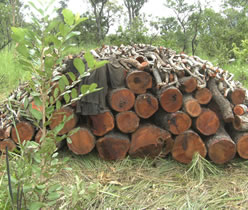 Ghana’s logging permits have been messed up as three quarters of the permits will not fall within the legal definition the country agreed with the European Union, a new document has revealed.
Ghana’s logging permits have been messed up as three quarters of the permits will not fall within the legal definition the country agreed with the European Union, a new document has revealed.
Obtained and published May 28, 2013 by Global Witness, a UK-based group that investigates corruption of natural resources, the document showed that majority of timber being cut in Ghana and exported carries a high-risk of being illegal.
This was based on analysis the group made of over 800 permits handed to logging companies in Ghana.
These revelations come ahead of a high level progress meeting this week between the EU and Ghana on measures to stamp out the trade in illegal Ghanaian timber.
It said the situation now poses risks to importers in the EU.
“This could land European importers with a substantial jail term or heavy fine, under the EU’s new Timber Regulation (EUTR) which came into force in March 2013,” GW said. The EU Regulation stipulates penalties such as two years imprisonment or a 50,000 euro fine.
The document identified that Ghana’s logging permits are in a mess.
“Ghana’s logging permits are in a mess. Of six types of permit issued by the authorities to logging companies, only two fall within the government’s own definition of what is legal,” said David Young, GW’s Forest Sector Transparency Campaigner who also conducted an independent review of the lists of permits.
The GW indicated that there is a new list that also directly contradicts a register of permits published by the Ghana Forestry Commission “to show proof of the legal sources of wood” in anticipation of the advent of the EUTR which requires importers to assess risk and avoid the import of illegally harvested timber into Europe.
Mr Young said “We have seen two lists – the one the Government of Ghana made public before the new regulations kicked in, and one it sent us. The numerous inconsistencies suggest the first step in ensuring legality – the allocation of permits – is not working. Buyers should be worried about that: if they are caught importing timber cut under an illegal permit they could face up to two years in jail in some jurisdictions.”
GW’s briefing calculates that 300 of the 800 permits in Ghana are currently operable, covering 15,500 km2.
It adds; “Types of permit clearly recognised in the legal framework, such as ‘ratified Timber Utilisation Contract’ account for 3,100 km2 in total, while other kinds which are not recognised in law such as ‘Leases’, ‘Harvesting Rights’ and ‘Entry Permits’ cover a much greater area – roughly 12,400 km2.”
Ghana and the EU in 2010 formally agreed on a Voluntary Partnership Agreement (VPA). This stipulated that Timber Utilisation Contracts ratified by parliament should be the principal means of obtaining a right to cut timber, yet, the GW says its new evidence shows only 20% of current permits fall into this category.
It stated that the legal definition included in the VPA will apply as soon as a new Legality Assurance System is in place to track timber from source to market.
According to Mr Young, until the Ghana government gets its house in order, European buyers should consider all Ghanaian timber products as extremely risky, and make sure they are doing thorough checks along their supply chains.
Mr David Young is warning that “The European Commission and the Government of Ghana meet this week to discuss progress on the VPA. Standardising logging permits so that they conform to the constitution and the laws of Ghana, and reversing the historic under-pricing of timber rights, should be high on their agenda”.
Ghana Business News























